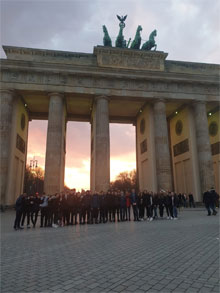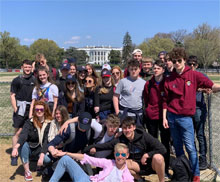History

Our history department at Christleton is firmly rooted in the 5 C’s of Christleton High School - with an emphasis on collaboration and cheerfulness! As a department with a strong team ethos, we hope to demonstrate both our efficiency, and enjoyment, in working together to achieve our goals. We have ultimate respect for our subject and, as such, our specialist teachers commit to the continued study of the subject of history by researching new, developing, and varied historical interpretations to really help bring our subject alive and demonstrate its relevance in today’s modern world.
Students are encouraged to be critical, analytical and evaluative as we search for meaning in contemporary source information across a range of different topics. These challenging skills are developed from Year 7 and form the basis of how we plan our curriculum. Other important historical skills are also emphasized in our curriculum such as the understanding of cause and consequence, significance, and change over time - the variety and challenge of which enables students to be fully engaged in the rich history that we explore.
Our History curriculum at Key Stage 3 is the focus of on-going development with new topic areas continuously being developed such as ‘The Crusades’ in Year 7, a depth study of ‘India and the British Empire’ in Year 8 and ‘Conflicting Ideologies’ in Year 9. In addition to this, we work hard to provide additional opportunities for students to extend their knowledge in each topic area by providing signposted materials to support independent research which focus on developing skills of both depth and breadth.
We also appreciate the significance of developing students knowledge of local history and have worked with Christleton Villages History Group to create ‘Christleton Great War Stories’ which, with the help of funding from the National Lottery and the tireless research of Mr David Cummings, has led to the creation of our own Christleton archive - a collection of individual stories which can now be found on the web site www.christleton.org.uk.

As a further encouragement to explore local history independently, we also provide our parents with links to local attractions that support the teaching of our topics. We believe that History should be experienced both inside and outside the classroom and as such we are involved with a variety of extra-curricular activities. In recent years our students have been on visits to Ypres, Rome, Washington, New York, Berlin and even China in the past!
At GCSE, students will follow the Edexcel Syllabus which involves the study of Superpower Relations 1941-1991, The Russian Revolution 1917-1941, Medicine in Britain 1250 - present day (including a study of surgery and treatment on the Western Front from 1914-1918) and Early Elizabethan England from 1558 - 1588, which we hope will provide a both range and depth to our students historical knowledge. History remains one of the most popular choices for students selecting A levels at CHS.
At A Level, students in Year 12 will be investigating the theme of ‘Searching for Rights and Freedoms’ which is route F of the Edexcel History Syllabus. We will study both the USA and South Africa to explore this theme and our investigation will continue to build on the source analysis and interpretation skills developed in Key Stage 3 & 4 and will offer an opportunity to focus on both breadth and depth study. In Year 13, students will complete a 4,000 word coursework dissertation on an issue of historical debate and will also study Rebellion and disorder under the Tudors, 1485-1603.
Downloads
| Title | |
| Assessment of Historical Knowledge in KS3 | Download |
| Curriculum Map | Download |
| Curriculum Overview | Download |
| KS3 History Year 7 and Year 8 Assessment Grid | Download |
| Learning Journey | Download |
| Year 7 Skills mark Scheme | Download |
| Year 8 Skills mark Scheme | Download |
| Year 9 Skills mark Scheme | Download |
Podcasts
Please click a section below to expand:
Russia and the USSR, 1917-1941
Why was Russia ripe for Revolution in 1917?
Provisional Government and Events of 1917
Bolshevik Consolidation of Power 1917-18
The Russian Civil War
War, Communism and NEP
The Power Struggle 1924-29
Purges - Great Terror
Propaganda Censorship
Collectivisation
Industrialisation
Life in the Soviet Union - Women and Minorities
Superpower relations and the Cold War, 1941-91
Origins of the Cold War
Truman Doctrine / Marshall Plan
Berlin Crisis 1948-49
Arms Race
Hungarian Uprising
Berlin Wall
Cuban Missile Crisis
Prague Spring and Czechoslovakia
Detente
Afghanistan
Reagan - Gorbachev
Fall of Berlin Wall
Fall of the Soviet Union
Medicine in Britain, c1250-present
Black Death
Unit 1 - Beliefs about Disease
Unit 1 - Treatments 1
Unit 1 - Treatments 2
Unit 2 - Great Plague 1665
Unit 2 - Medicine
Unit 3 - Florence Nightingale
Unit 3 - Louis Pasteur and Robert Koch
Unit 3 - Antiseptics and Anaesthetics
Unit 3 - Cholera
Unit 3 - Edward Jenner and Vaccinations
Unit 3 - Public Health Act
Unit 4 - DNA and Genetics
Unit 4 - Lung Cancer
Unit 4 - Magic Bullets
Unit 4 - Penicillin
Unit 4 - The NHS
Unit 5 - Medicine in the Early 20th Century
Unit 5 - Key Battles
Unit 5 - Trench Systems
Unit 5 - Types of Injuries
Unit 5 - RAMC FANY and the Chain of Evacuation
Unit 5 - Medical Advances
Early Elizabethan England 1558 - 1588
Unit 1 - Elizabeth’s Government
Unit 1 - Elizabethan Society
Unit 1 - Elizabeth’s Problems
Unit 1 - Elizabeth’s Character and Strengths
Unit 1 - Elizabeth’s Financial Weaknesses
Unit 1 - Elizabeth’s Challenges Abroad
Unit 1 - Religious Divisions and Settlement
Unit 1 - Role of the Church of England
Unit 1 - Challenge to Religious Settlement
Unit 2 - The Catholic Challenge Abroad
Unit 2 - Mary Queen of Scots
Unit 2 - The Revolt of the Northern Earls
Unit 2 - The Ridolfi Plot
Unit 2 - Throckmorton - Babington
Unit 2 - Walsingham
Unit 2 - Execution of Mary Queen of Scots
Unit 2 - Spain as a Political, Religious and Commercial Rival
Unit 2 - The Netherlands - Cadiz
Unit 2 - Armada Causes
Unit 2 - Armada 2 Events and Reasons for English Success
Unit 2 - Consequences of the Armada
Unit 3 - Elizabethan Education
Unit 3 - Sports, Pastimes and the Theatre
Unit 3 - The Problem of the Poor
Unit 3 - Changing Attitudes Towards the Poor
Unit 3 - Factors Prompting Exploration
Unit 3 - Drake’s Circumnavigation of the Globe
Unit 3 - Attempted Colonisation of Virginia
Unit 3 - Failure of Virginia









